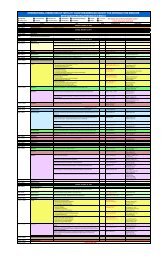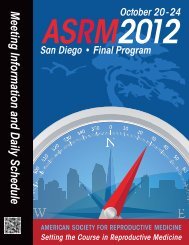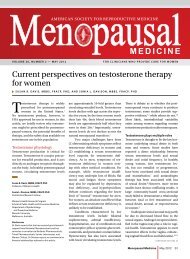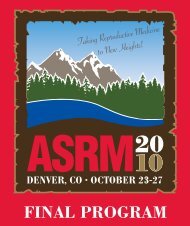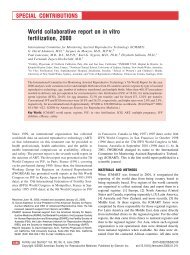scientific program • symposia - American Society for Reproductive ...
scientific program • symposia - American Society for Reproductive ...
scientific program • symposia - American Society for Reproductive ...
Create successful ePaper yourself
Turn your PDF publications into a flip-book with our unique Google optimized e-Paper software.
44 TH ANNUAL POSTGRADUATE PROGRAM<br />
including nurses, physicians, psychologists, and other healthcare professionals is involved in the screening and treatment<br />
of the infertile couple and is often asked to review these risks with prospective patients. These reproductive healthcare<br />
providers have the need to provide counseling to patients, identify couples at potential risk, and utilize strategies in an ef<strong>for</strong>t<br />
to reduce these risks and help couples who are experiencing infertility to create healthy families.<br />
This one-day course has been designed <strong>for</strong> nurses, social workers, psychologists and other reproductive endocrinology<br />
and infertility professionals. It will provide an overview of the outcome data on the health and well-being of ART- and donoroocyte-conceived<br />
children, as well as provide in<strong>for</strong>mation on risks associated with ART.<br />
LEARNING OBJECTIVES<br />
After participating in this course, participants should be able to:<br />
1. Discuss outcome data on the medical and psychological health of ART-conceived children.<br />
2. Summarize strategies <strong>for</strong> reducing the occurrence of multiple gestation pregnancies.<br />
3. Describe the role of the nurse in counseling patients regarding pregnancy and pediatric outcomes post-ART.<br />
________________________________________________________________________________________________________________________<br />
CONFRONTING AND SOLVING LEGAL ISSUES WITHIN ART PRACTICE: A PRACTICAL APPROACH<br />
Course PG3 (Saturday) <strong>•</strong> ROOM 231 A/C CME<br />
Developed in Cooperation with the Legal Professional Group<br />
FACULTY<br />
Margaret E. Swain, R.N., J.D., Chair<br />
Nidhi Desai, J.D.<br />
Nanette Elster, J.D., M.P.H.<br />
John S. Rinehart, M.D., J.D.<br />
ACGME COMPETENCY<br />
Patient Care<br />
Systems-based Practice<br />
NEEDS ASSESSMENT AND COURSE DESCRIPTION<br />
Confronted with the complicated relationships in ART among intended parents, gamete donors and gestational surrogates,<br />
the medical team often does not appreciate the legal constructs of duty of care to each participant, terms of contractual<br />
agreements among the parties, consequences of certain behaviors, and whether or not state law permits the behavior<br />
contemplated by the treatment plan. While medical practitioners should not be offering legal advice, awareness of the<br />
legal complexities and possible restrictive regulations and laws ensures that the providers offer services within the confines<br />
of best practice and legal constraints. Recognition of those arrangements that require a partnership of legal and medical<br />
experts is essential to satisfying the intentions of all involved in the creation of family, and in most cases, an experienced<br />
legal expert can assist doctor and patient in establishing a smooth treatment course.<br />
This course <strong>for</strong> physicians, nurses, social workers, scientists, psychologists and other medical and legal professionals, is<br />
designed to review commonly encountered situations that are subject to legal scrutiny, define the parties, explain potential<br />
pitfalls, provide practical solutions to roadblocks in ART arrangements and explore the legal significance of emerging<br />
technologies and practices. In this practical rather than theoretical presentaion, speakers will address realistic approaches<br />
based on solid legal precedent and principles. Further, each presenter will field questions from attendees that will allow <strong>for</strong><br />
further discussion of particular clinical conundrums, with the opportunity to develop usable solutions <strong>for</strong> clinical practice.<br />
LEARNING OBJECTIVES<br />
After participating in this course, participants should be able to:<br />
1. Identify and discuss legal issues in ART, including the need <strong>for</strong> contracts.<br />
2. Summarize the obstacles, immigration issues and laws (both national and international) regulating parentage.<br />
3. Assess proposed legislation and its impact on ART and develop a plan <strong>for</strong> advocacy within the state.<br />
4. Describe the donor registry, summarize legal issues inherent in the registry, and explain the registry’s potential impact on<br />
reporting and record keeping.<br />
5. Critically analyze newly introduced treatment modalities, including potential legal issues and approaches to preventing/<br />
solving legal problems.<br />
6. Discuss the legal relationships among ART participants and list potential areas <strong>for</strong> conflict.<br />
________________________________________________________________________________________________________________________<br />
43




